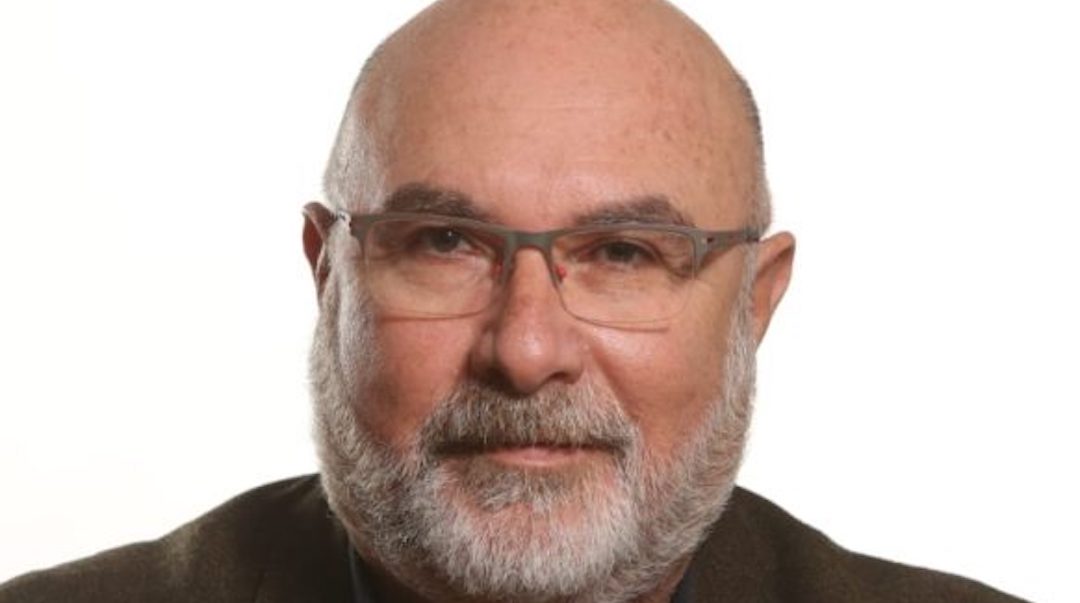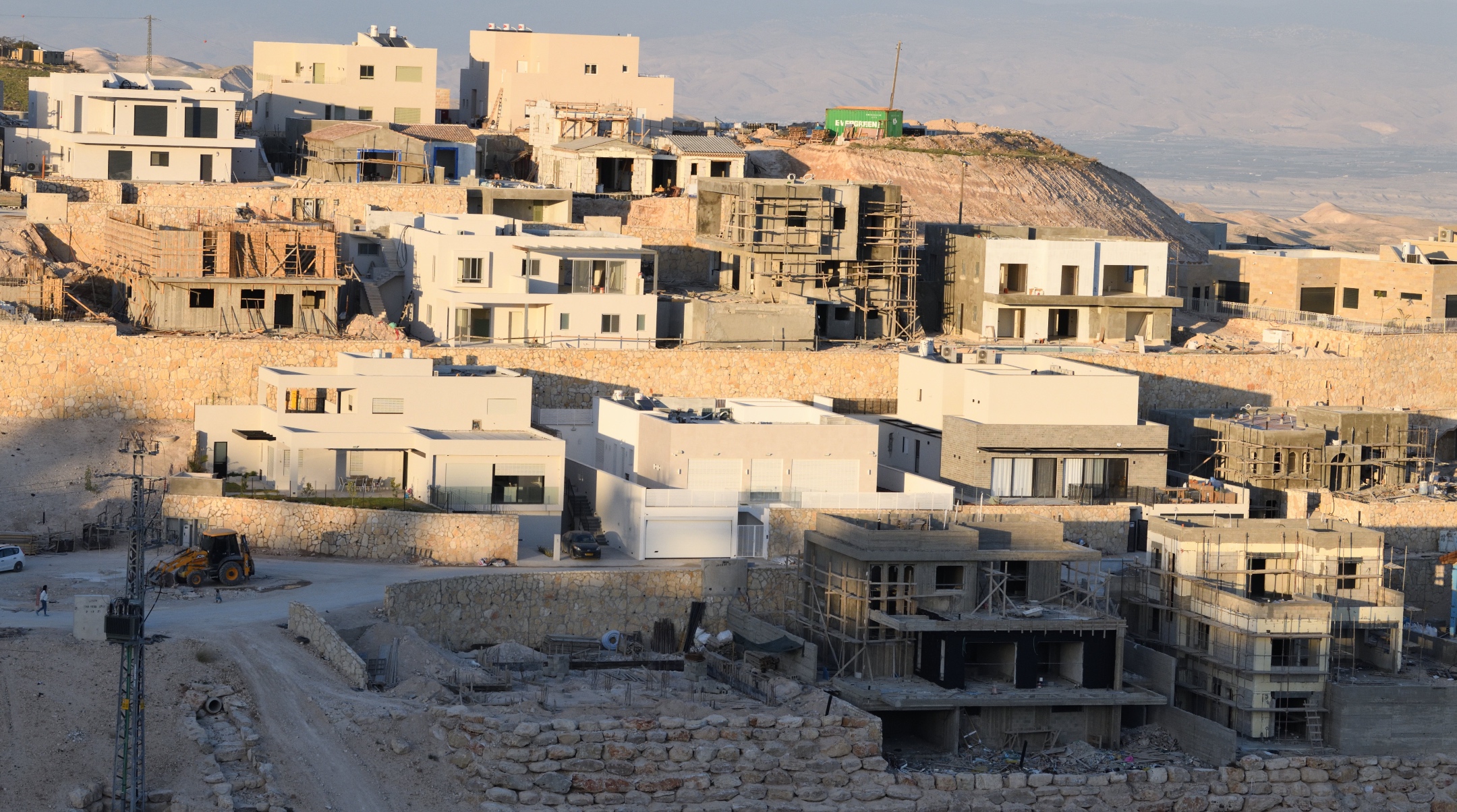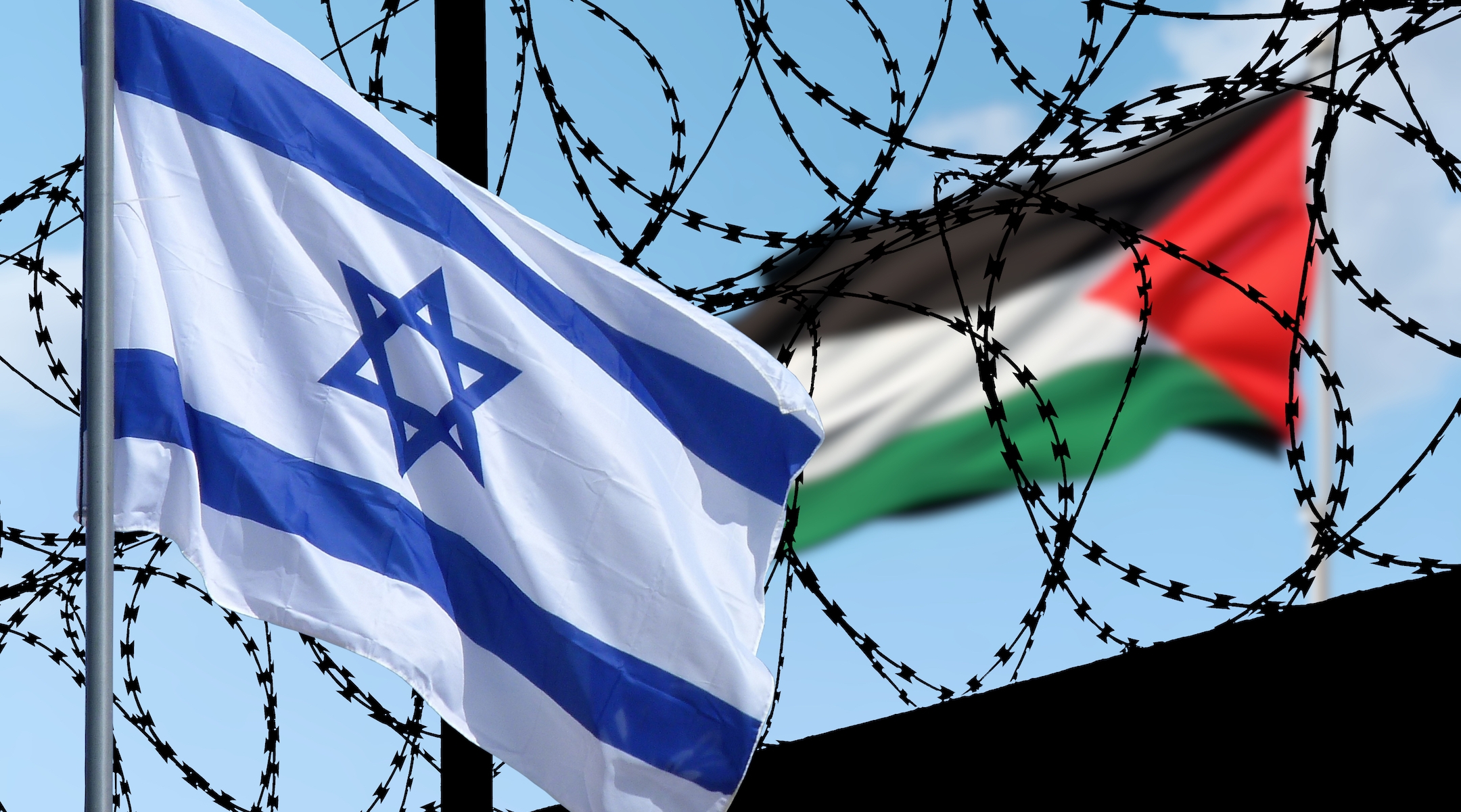(JTA) — Whether it succeeds in its goal of destroying Hamas, or just deals it a devastating blow, it seems certain that following its war in Gaza, Israel will not accept the status quo ante.
What comes next, however, is impossible to predict. The Biden administration has been pushing for a two-state solution led by what the president has called a “revitalized” Palestinian Authority. Israeli Prime Minister Benjamin Netanyahu remains fundamentally opposed to the idea, preferring to keep Gaza and the West Bank under Israeli control, with Palestinian population centers administered separately by local players unconnected to Hamas.
Meanwhile, Israel’s far-right parties talk of the “voluntary migration of Gaza’s residents” and returning Jewish settlers to the Gaza Strip, from which Israel withdrew in 2005.
With more than 100 Israelis still being held hostage and the war still raging, few in Israel are focused on what happens next. But some Israeli scholars and analysts are looking beyond the day after. A few weeks ago I spoke with Nimrod Novick, a fellow at the left-leaning Israel Policy Forum, who believes that Israel needs to seize the initiative and work aggressively toward a two-state solution. If not, he predicts, his country will become a non-democratic state forever at war with the 2 million Palestinians in Gaza and 3 million in the West Bank.
For a different view, I recently spoke with Kobi Michael, a senior researcher at the Institute for National Security Studies (INSS) and an expert at the Misgav Institute for National Security and Zionist Strategy, two right-leaning think tanks in Israel. Michael accepts the logic of separation with the Palestinians, but feels that talking now about a Palestinian state is premature.
A former deputy director general and head of the Palestinian division in Israel’s Ministry of Strategic Affairs, he said the Palestinian people are not yet ready to accept the idea of a nation state of the Jewish people. Nor does he think the Palestinian Authority under the leadership of its 88-year-old president, Mahmoud Abbas (to whom he refers using Abbas’ nom de guerre, Abu Mazen) has the will, capability or credibility to govern effectively in Gaza, let alone the West Bank.
“Nothing good can come out from the bilateral level between the Israelis and the Palestinians,” he said.
Instead, Michael imagines an interim period of state-building, in which regional players like Saudi Arabia play a hand in rebuilding Gaza and creating a viable Palestinian leadership.
“The Palestinians should be part of this regional architecture,” he told me, “assuming a reasonable Palestinian leadership that will be able to accept the right of the State of Israel to exist as the nation state of the Jewish people.”
Our conversation has been edited for length and clarity.
Since the outbreak of the war the Biden administration has been advancing support for a two-state solution to the Israeli-Palestinian conflict. Israel’s Prime Minister Benjamin Netanyahu has rejected this approach, saying it would be a “huge reward for terrorism.” Do you think there is a possibility for two states, either in the long or short term?
There is a big difference between the Israeli approach to the two-state solution and the Palestinian approach. In Israeli eyes it means a nation state of the Jewish people, and Palestine is the nation state of the Palestinian people. This is not the Palestinian perspective, where Palestine is the nation state of the Palestinian people and Israel is the state of citizens without any religious, ethnic or national characteristics. This is the core problem of the conflict: the Palestinian refusal to recognize the right of the Jewish people for self-determination. They regard Judaism only as a religion. If there is no Jewish people, there is no right for self- determination.
You’re saying that despite the Oslo accords, signed in 1993, in which the PLO “recognizes the right of the State of Israel to exist in peace and security,” the Palestinians have not in fact recognized the legitimacy of the national rights of the Jewish people.
You have to see what is written in the curriculum of the Palestinian schools. And you have to listen to the things that are said by Palestinian officials and to the incitement in the Palestinian media, which is under the Palestinian Authority control.
Neither Abu Mazen nor any other Palestinian official has found time or opportunity even to condemn the attacks of Oct. 7. So the idea of a two-state solution is a very illusionary idea, at least for the time being under the current circumstances. [Abbas said on Oct. 12, 2023 that “We reject the practices of killing civilians or abusing them on both sides,” and on Oct.15 that “the policies and actions of Hamas do not represent the Palestinian people.”—Ed.]

Kobi Michael is a senior research fellow at the Institute for National Security Studies in Tel Aviv. (Misgav Institute)
You told CNN that Israel does not intend to remain in Gaza and to rule the population there. So if not a Palestinian state, what is the option for both Israel and the Palestinians?
A local technocratic administration will be built to govern the Gaza Strip. It will take time. There is a need for an interim period, where an international or regional trusteeship, or a combination of both, will have a mandate to control the territory and the population and to begin the reconstruction process of the Gaza Strip. And in parallel, they will train a local, practical administration that will be capable in controlling, independently, the territory and the population — control that will be transferred in a very gradual and responsible manner. That will take no less than five years. And the Palestinian Authority should go through a very significant reform process, bringing it to the status of a “Revitalized Palestinian Authority,” to use President Biden’s terminology. This will be conducted according the regional architecture based on the normalization process between Israel and the Arab countries, mainly Saudi Arabia [which includes the Abraham Accords and signals from Saudi Arabia, outlined in 2023, of what it would seek in exchange for normalizing relations with Israel].
This imagines joint self-governance over the West Bank and Gaza?
The two entities, the Gaza Strip and the West Bank, will be able to be reunited in a framework of a federation. Then, later on, maybe this federation will be part of a bigger confederation with Jordan, I don’t know. But I do not believe that the Palestinian Authority is capable, under the current circumstances, to regain effective control over the Gaza Strip and the reconstruction process. I do not believe that any reunification between the Gaza Strip and the West Bank under the current circumstances will contribute something positive to either of the entities.
What about the Palestinian Authority makes it unfit at this moment to lead this process of reconstruction and unification?
They must go through a very significant process of change and reform. They have to build their institutions, they have to deal with corruption, the dysfunctionality caused by nepotism, they have to enforce the law, to build their economy, to build the civil society. For a functioning independent state, they’re pretty far from that. They also suffer from a huge deficit of legitimacy among the Palestinian constituency. And they have to go through a very significant reform in their security apparatus because they are not able to curtail terror attacks.
And there must be personnel changes. The idea that Abu Mazen is the sole authority, the idea that the old guard of Fatah are in control of everything, must change.
There are other major changes that must be done in the Palestinian arena. The first one is a very significant change in the psychological infrastructure of the constituents, of society. Because we’re talking about a poisoned psychological infrastructure that resulted from three decades of systemic indoctrination. The constant victimhood, the insistence on the right of return, which is the other side of the coin of their refusal to accept the right of the Jewish state to exist as a nation state of the Jewish people. Now we’re talking about the fifth generation of Palestinians to be recognized as refugees, and this is the only population of refugees in the world that instead of decreasing is increasing. [UNRWA, the UN agency created to serve the displaced population, reported that 5.9 million Palestinians are currently registered as refugees. When the agency began operations in 1950, it counted about 750,000 Palestinian refugees.—Ed.]
And the other pillar of this indoctrination was resistance and terrorism. The Palestinian Authority supports terrorism, indoctrinates for terrorism, pays money to the families of terrorists. The Palestinian Authority glorifies terrorism.
So you mentioned this federation or confederation. How might that work? If not two states, what is a federation?
It is two states, because a federation is a state. But the idea for the region is that the district of Gaza and the district of the West Bank will not be connected geographically — at least under the current circumstances. The idea of federation is that each entity will be governed by a local government, and there will be a federal government that will be responsible for foreign policy and security and so on.
What’s the role of both Israel and the United States, as its closest partner, in nurturing what you say could be a five-year process of transition?
The United States, the international community and the regional countries must clarify to the Palestinians that without the changes I described nothing will come out. And I think that if they try to impose a Palestinian state they will reach just the opposite results. A Palestinian state cannot be imposed on Israel. Israel has to enable the conditions for such a process, and the mandate of this international jurisdiction should be to enable this federation to make progress towards an independent state.
But the United States and the more significant European countries — mainly Britain, Germany, France — can play a significant role together with the Saudis, the Emirates, Jordan and Morocco. Such a coalition could be built even without the United Nations because the UN is not, I would say, a positive element in this regard. And we have to ensure that Qatar and Iran not be part of this traditional regional formation because these two countries are very problematic.
You’ve talked about the new regional architecture. What’s in it for Saudi Arabia and the Sunni Arab world to be part of this process?
Once there is a regional architecture, that will be a counter-axis to the Iran axis. We can establish a security alliance and we will be able to enlarge in a very dramatic way economic cooperation, infrastructure cooperation, and new routes can be opened from India through Saudi Arabia, Jordan, the Palestinian Authority and Israel regarding energy, water, agriculture, tourism, industrial zones and so on and so forth. The labor markets in the Gulf countries could be opened to educated Palestinians who will be able to go to work there and to send money to their families, money that will enable the Palestinian entity to be developed. It will open new opportunities and will enable both sides, the Israelis and the Palestinians, to have a broader basis of flexibility.
Nothing good can come out from the bilateral level between the Israelis and the Palestinians. But when we’re talking about regional architecture, we’re talking about the multilateral level, with new players, new agendas, new interests and new resources coming in.

A construction site of a new residential neighborhood at the mixed religious-secular Jewish settlement in the West Bank Kfar Adumim, March 9, 2023. (Gili Yaari /Flash90)
What will be demanded of Israel under a confederation or federation? Do you imagine there will be territorial compromise and retreating on some of the settlements?
Yes, of course. There will be territorial compromises but under very strict security conditions that will enable the Israel to defend itself by itself and prevent the possibility that anything like Oct. 7 will occur once again.
So just so I don’t mischaracterize your position: Your disagreement with the administration calling for a Palestinian state is really about the timeframe and conditions imposed on the Palestinians, not around the idea of separation.
I think separation is a must. Any sort of engagement with the Palestinians is a recipe for a very chaotic and dangerous situation. I prefer to have very high fences, but with the time and under the regional architecture, maybe the need for such defenses will become less great.
And you’re saying that pressing hard for a Palestinian state during or in the immediate aftermath of the war is both premature and needs a lot of these other factors in place for anyone to even think about it.
Yes, of course. How can you talk about a Palestinian state when 82% of the entire Palestinian society supports the massacre of Oct. 7? [A December survey from a respected Palestinian polling institute found that 72 percent of respondents in Gaza and the West Bank — including 85 percent in the latter — believed the Hamas attack was “correct” given its outcome up to that point.—Ed.]
I know it’s hard to talk about optimism at a time like this while the fighting is going on. Do you find yourself optimistic?
I’m very optimistic. I think at the end of the day Israel will become much stronger after this war. And I think that the vast majority of Israeli society is much more sober with regard to the Palestinians and the reality that we live in. I think that the Israeli consensus is much broader now. The resilience is very impressive, and I think that the Jewish people and the State of Israel will be able to repair itself and prosper and to live in security for the next eight decades.
JTA has documented Jewish history in real-time for over a century. Keep our journalism strong by joining us in supporting independent, award-winning reporting.







